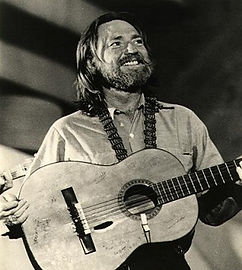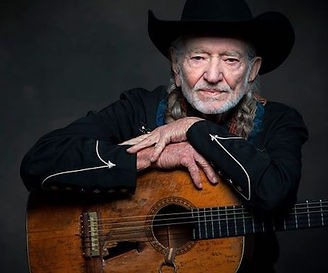REAL
COUNTRY
MUSIC
JUKEBOX


Willie Nelson
Country singer and songwriter Willie Nelson rose to prominence at the end of the 1960s and contributed to the "outlaw country" subgenre, which challenged the music industry conservatism of Nashville at the time. During his lengthy, award-winning career, he has written some of the most popular and memorable country songs of all time, many of which have been covered by a wide range of artists over the last half-century. Now in his 80s, Nelson continues to record, tour and devote time to charitable and political causes.
Willie Hugh Nelson (born April 29, 1933) is an American musician, actor, and activist. Nelson learned to play guitar from his grandfather and at the age of 10 was performing at local dances. He served in the U.S. Air Force before becoming a disc jockey in Texas, Oregon, and California during the 1950s. He also was performing in public and writing songs then. By 1961 he was based in Nashville, Tennessee, and playing bass in Ray Price’s band. Price was among the first of dozens of country, rhythm-and-blues, and popular singers to achieve hit records with Nelson’s 1960s tunes, which included the standards “Hello Walls,” “Night Life,” “Funny How Time Slips Away,” and, most famously, “Crazy.” By contrast, Nelson achieved only modest success as a singer in that decade.
In the early 1970s Nelson moved back to Texas and, with Waylon Jennings, spearheaded the country music movement known as outlaw music. Beginning with the narrative album Red Headed Stranger (1975), which featured the hit song “Blue Eyes Crying in the Rain,” he became one of the most popular performers in country music as a whole. Nelson’s performances featured a unique sound, of which his relaxed behind-the-beat singing style and gut-string guitar were the most distinctive elements. Unusual for a country album, songs by Hoagy Carmichael, Irving Berlin, and other mainstream popular songwriters made up his Stardust (1978), which eventually sold more than five million copies in the United States. Nelson found further crossover success with the album Always on My Mind (1982) and the single “To All the Girls I’ve Loved Before” (1984), a duet with Julio Iglesias. After making his film acting debut in The Electric Horseman (1979), Nelson appeared in such movies as Honeysuckle Rose (1980)—which introduced what would become his signature song, “On the Road Again”—and Red Headed Stranger (1986), a drama based on his album.

In 1990 the Internal Revenue Service, claiming Nelson owed $16.7 million in unpaid taxes, seized his assets. To raise money, he recorded the album The IRS Tapes: Who’ll Buy My Memories (1991), which initially was available only through phone orders but was sold in stores beginning in 1992. Despite that setback, he continued to record at a prolific pace into the 21st century. His subsequent albums included Across the Borderline (1993), the atmospheric Teatro (1998), and the reggae-tinged Countryman (2005).
As Nelson aged into the role of a musical elder statesman, his recordings increasingly focused on traditional songs and covers. Among them were Heroes (2012); Let’s Face the Music and Dance (2013), a collection of standards; To All the Girls… (2013), a series of duets with female singers; and Summertime (2016), a set of George Gershwin songs. In 2014 Nelson issued Band of Brothers, which comprised largely new material, and Willie’s Stash, Vol. 1: December Day, the first in a series of releases from his vast catalogue of recordings. The latter record focused on his collaborations with his sister and pianist, Bobbie. God’s Problem Child (2017) and Last Man Standing (2018) are collections of original meditations on mortality. Nelson’s later albums included My Way (2018), a tribute to Frank Sinatra, and Ride Me Back Home (2019). Throughout his career he recorded with dozens of other singers and released album-length collaborations with such musicians as Jennings, Merle Haggard, and jazz trumpeter Wynton Marsalis. He was the recipient of numerous Grammy Awards.

In addition to his own performance career, Nelson produced annual Fourth of July country music festivals in Texas and elsewhere, and in 1985 he cofounded Farm Aid, which organized festivals to raise money for farmers. Nelson was a well-known and enthusiastic connoisseur of marijuana, and, after a few states legalized the drug’s sale and purchase, he launched (2015) a marijuana supply company, Willie’s Reserve. He penned several memoirs (with coauthors), including Willie: An Autobiography (1988), Roll Me Up and Smoke Me When I Die: Musings from the Road (2012), and It’s a Long Story: My Life (2015).
Nelson was inducted into the Country Music Hall of Fame in 1993. He accepted a Kennedy Center Honor in 1998, and in 2015 he received the Library of Congress Gershwin Prize for Popular Song.

